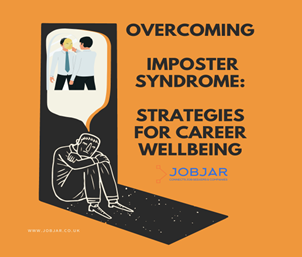Overcoming Imposter Syndrome: Strategies for Career Wellbeing by Elena Prodan
The concept of Imposter Syndrome has become increasingly relevant in today's challenging times. But what exactly does Imposter Syndrome entail? It's a phenomenon many of us experience—a persistent feeling of self-doubt about our work accomplishments, making us feel like phonies who don't deserve our jobs. It manifests as a nagging voice telling us, ‘You don't deserve this success’ or ‘You are not good enough.’
Imposter Syndrome presents itself in various ways, but common characteristics include self-doubt in your skills and competence, belief that you are a fraud, perfectionism, experiencing overwork and burnout, isolation from team members, low self-esteem, stress, setting impossibly high standards for ourselves.
Facing Imposter Syndrome head-on requires a multifaceted approach. Here are six empowering strategies that can guide you on your journey to overcoming these feelings and fostering career wellbeing:
1. Make a list of accomplishments
Make a list of accomplishments every single day. When you start to write all of them, categorise them, it can be big and small achievements. Avoid judgement, simply acknowledge the things you are doing well, making a mental note of your success.
2. Seek support
Open up about your feelings to trusted friends, family, or mentors. Professional guidance from therapists can also offer a tailored approach to navigating these feelings. Vocalising your experiences can provide perspective and support, and personalised strategies can help develop coping mechanisms and cultivate a greater sense of self-worth.
3. Take care of yourself
Engage in activities that relax and recharge you, maintaining a healthy work-life balance. Taking care of your physical and mental wellbeing is crucial for combating imposter syndrome. Consider meditation as a powerful tool to manage imposter feelings by enhancing self-awareness and resilience.
4. Challenge Negative Thoughts
Replace negative imposter syndrome thoughts with positive affirmations and realistic perspectives. Remember that affirmations are a tool designed to help you positively reprogram your mind towards improvement. Choose affirmations that resonate with you, write them down, and repeat them daily to bolster confidence in your abilities. For example: ‘I recognise my unique strengths and abilities’, ‘I choose to focus on my strengths’, ‘I have the power to define my success and rewrite my story’, ‘My ideas are as important as anybody else’s’, ‘I am an asset to my team and workplace.’
5. Stop comparing yourself with others
Recognise that everyone’s path is different, and comparing yourself to others only undermines your own progress. Shift your focus from competition to collaboration, acknowledging that every individual has unique strengths to contribute. You are individually unique with your own strengths, talents, and gifts.
6. Embrace your fear
Recognise fear as a natural instinct designed to keep you safe. Facing your fears can lead to personal growth and increased resilience. You will notice that once you embrace it, it will naturally decrease over time. Moreover, embracing gratitude can be a transformative tool in your journey, guiding you towards self-acceptance and empowerment.
By implementing these strategies, you can begin to dismantle the grip Imposter Syndrome may have on your career wellbeing, stepping into a space of self-recognition and acceptance.

